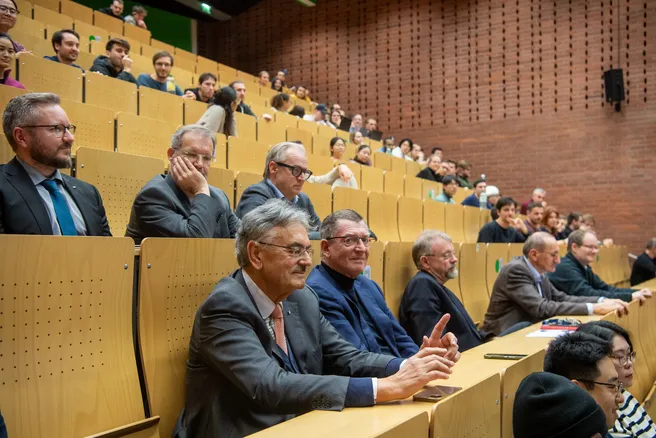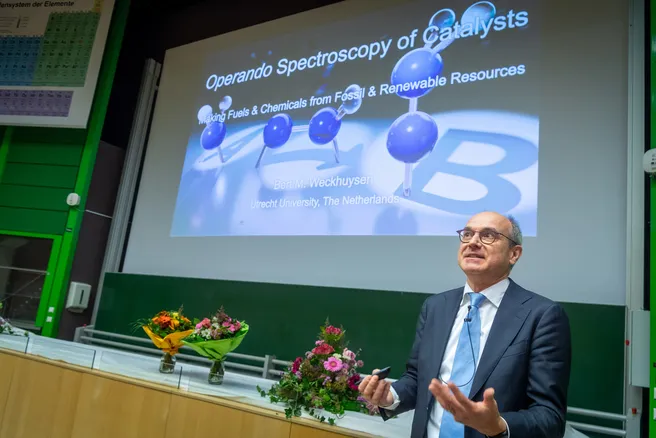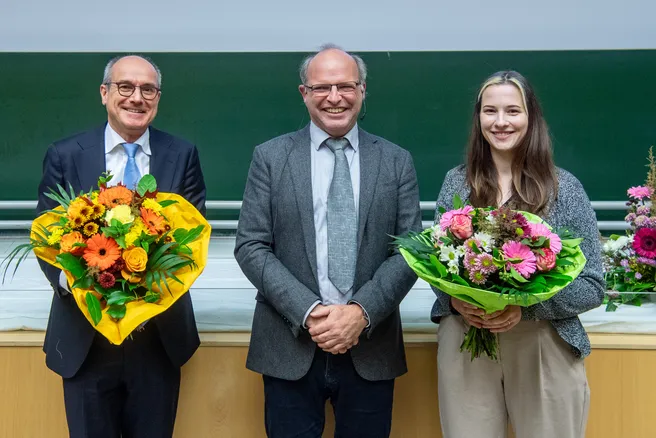On November 14, 2024, the Dr. Karl Wamsler Innovation Award Symposium took place under the motto “Advancing Catalysis Science” at the Central Institute for Catalysis Research (CRC) of the Technical University of Munich (TUM). This year's award recipient is the renowned chemist Prof. Bert M. Weckhuysen (Utrecht University, Netherlands).
The event celebrated outstanding contributions to catalysis research and brought together professors, students and partners of TUM. Prof. Roland Fischer, Senior Academic Director of the CRC, opened the symposium at 2:15 PM. In his welcome speech, he extended a warm welcome to this year's award recipient, Prof. Bert M. Weckhuysen (Utrecht University, Netherlands), the Wamsler family, Dr. Friedemann Rohrfrom Clariant, TUM Vice President for Research and Innovation Prof. Gerhard Kramer, TUM President Emeritus Prof. Wolfgang A. Herrmann, and all attendees.
Prof. Kramer highlighted the importance of catalysis in his subsequent speech: “Today, we celebrate catalysis research.” The Dr. Karl Wamsler Innovation Award is a symbol of the successful partnership between TUM and Clariant chemical company, “The legacy of Karl Wamsler lives on through this award” He emphasized the global reputation of catalysis research at TUM and the collaboration of the CRC with the Excellence Cluster e-conversion, which addresses the challenges of the energy transition. “I hope that this event inspires new ideas,” he concluded his speech and thanked Clariant and the Wamsler family for their longstanding support.
Following the opening speeches, Dr. Friedemann Rohr, Head of Sustainability and Business Intelligence at Clariant's Catalysts business unit, delivered the first lecture entitled, “Catalysis – The Indispensable Technology to Drive the Energy Transition.” Rohr emphasized the key role of catalysts as “the most important tools for modern societies and sustainable transformation” and illustrated their significant multiplier effects. Using steel production as an example, he demonstrated how Clariant has been able to significantly reduce carbon dioxide (CO₂) emissions in energy-intensive industries. He also discussed the unresolved challenges in catalysis, such as the energy efficiency of the Haber-Bosch process and the conversion of nitrogen oxides. At the end of his lecture, he addressed key processes in catalysis research, in addition to the two previously mentioned processes, the conversion of small molecules like carbon monoxide and CO₂, water, and hydrogen into various products for the chemical industry. His closing words ended with a call to everyone in the audience to initiate change processes, along with the quote: “We all carry the world within us.” For his “spectacular lecture” (according to Fischer), Rohr received a great round of applause from the attendees.
The presentation of the “CRC Best Paper Award” followed, presented by Prof. Thorsten Bach (Academic Director of the CRC). The paper award is being given for the first time in 2024 and recognizes outstanding publications in the field of catalysis research. The award “reflects the collaboration of various research groups in the field of catalysis within the CRC,” said Bach. This year, the award goes to first author Johanna Reich – a PhD student in the group of Prof. Barbara A. J. Lechner (TUM Professorship of Functional Nanomaterials)– for the publication “A Critical View on the Quantification of Model Catalyst Activity” published in Topics in Catalysis (2024). In the laudation written by Lechner, co-author Reich’s “cleverly designed experiments for measuring various reactivities” were particularly praised. In her subsequent talk, paper awardee Reich emphasized the relevance of scaling laboratory results and presented findings from the publication on platinum (Pt19) clusters on crystalline magnetite (Fe₃O₄) surfaces. She concluded by thanking the entire CRC organizing committee for the award. Fischer returned the thanks to Reich for her lecture and handed the floor over to Prof. Jennifer Strunk (Academic Director of the CRC) for the laudation of the guest awardee, Weckhuysen.
Strunk emphasized the importance of the award and the achievements of Weckhuysen: “The Karl-Wamsler Innovation Award is meant is to be ‘awarded to scientists, who have created innovative momentum with industrial potential in the field of catalysis’, and I am convinced that there is hardly a researcher that fulfills these criteria better than Bert Weckhuysen, with his outstanding works in the field of operando spectroscopy of heterogeneous catalysis.” She also highlighted Weckhuysen’s numerous scientific contributions to heterogeneous catalysis, which have rightfully earned him many international accolades. “Bert Weckhuysen has, over the years, developed an outstanding – internationally unmatched – toolbox for the study of the heterogeneous catalysts under real reaction conditions (known as ‘operando spectroscopy’). In addition, he manages to always combine several advanced spectroscopic techniques.”
Strunk concluded her speech with the words, “So, herewith, Bert, I would like to congratulate you for the 2024 Karl-Wamsler Award!”
In his subsequent lecture, “Operando Spectroscopy of Catalysts – Making Fuels and Chemicals from Fossil and Renewable Resources,” awardee Weckhuysen spoke about his vision of a sustainable future and his dream of making chemical reactions visible in detail, “seeing is believing.” He introduced the audience to the world of spectroscopic methods and emphasized the need for better catalysts. As an example, he demonstrated the diffusion of resorufin in zeolites and CO₂ hydrogenation over nickel particles, which provide new insights into the structure and activity of catalysts. At the end of his lecture, Weckhuysen also referred to such trends as the use of AI and microfluidics for a comprehensive “Catalyst Atlas” and encouraged young scientists to pursue their research drive, even if it may involve setbacks.
At the end of the symposium, Prof. Fischer moderated a question and answer session before officially concluding the event and – to great applause from the audience – presented flowers to award recipients Prof. Bert M. Weckhuysen and Johanna Reich.
The Catalysis Research Center and the TUM School of Natural Sciences warmly congratulate Prof. Bert M. Weckhuysen on receiving the Karl Wamsler Innovation Award 2024, as well as Johanna Reich on winning the 'CRC Best Paper Award.' Furthermore, we would like to sincerely thank Clariant AG and the Wamsler family for their long-standing support.
Further Information and Links:
- Dr. Karl M. F. Wamsler (1928–2016) studied chemistry and business administration in Munich and Chicago and received his doctorate in chemistry in 1955, magna cum laude. He initially worked for Shell corporation before joining Süd-Chemie in Munich in 1962. Throughout his career, he helped grow the company, first as a partner in the family inheritance and later as an active managing director, transforming it from a small regional business into an international corporation, always with a strong focus on innovation, particularly in the field of catalysis. For his dedication to the TUM University Foundation, the Technical University of Munich awarded him the title of Honorary Senator in 2015. In 2011, Clariant AG, a specialty chemicals company focused on sustainability based in Pratteln, Switzerland, acquired Süd-Chemie and established the Dr. Karl Wamsler Innovation Award in 2017.
- Prof. Bert M. Weckhuysen is a Distinguished Professor at Utrecht University (Netherlands). He received his Master's degree in 1991 from KU Leuven (Belgium). After completing his PhD in surface chemistry, spectroscopy, and catalysis at KU Leuven in 1995, he worked as a postdoctoral researcher at Lehigh University (Pennsylvania, USA) and Texas A&M University (USA). From 1997 to 2000, he was a research fellow of the Belgian National Fund for Scientific Research (NFWO, later FWO-Flanders) and was affiliated with KU Leuven. Since 2000, Weckhuysen has been a full professor at Utrecht University. In 2012, he was appointed the first Distinguished Professor of the Faculty of Science at Utrecht. His main research interests include the development of structure-activity relationships and expert systems in the field of heterogeneous catalysis and materials science, with a particular focus on the development and application of advanced operando techniques for catalyst characterization. Weckhuysen received the Dr. Karl Wamsler Innovation Award 2024 “for his contributions to visualizing heterogeneous catalysts in operando for the conversion of fossil and renewable feedstocks.”
- Dr. Karl Wamsler Innovation Award (TUM)
- Catalysis research at TUM (CRC)
- Read about the strategic partnership between TUM and the Clariant company
- Cluster of Excellence: e-conversion
- Best Paper Award: “A Critical View on the Quantification of Model Catalyst” in Topics in Catalysis (2024)
- Barbara A. J. Lechner’s group: Professorship of Functional Nanomaterials
Press Contact



